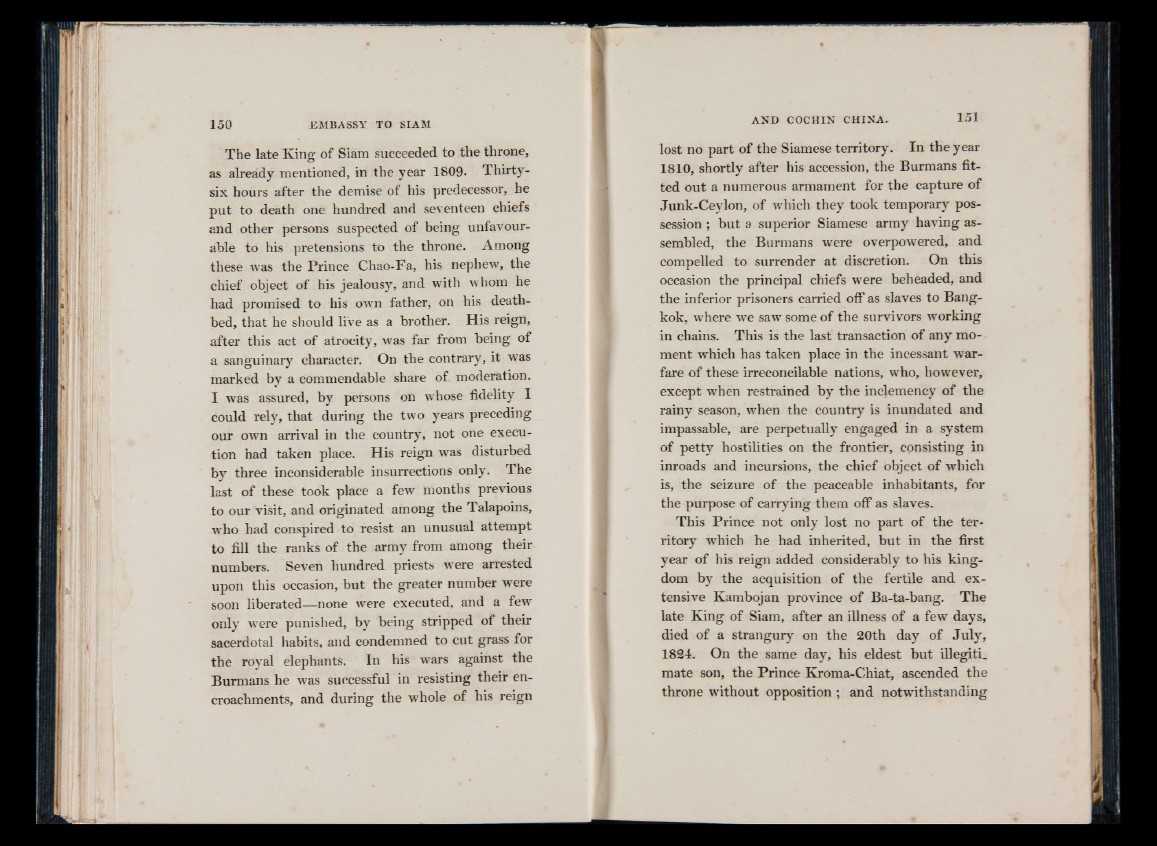
The late King of Siam succeeded to the throne,
as already mentioned, in the year 1809* Thirty-
six hours after the demise of his predecessor, he
put to death one hundred and seventeen chiefs
and other persons suspected of being unfavourable
to his pretensions to the throne. Among
these was the Prince Chao-Fa, his nephew, the
chief object of his jealousy, and with whom he
had promised to his own father, on his deathbed,
that he should live as a brother. His reign,
after this act of atrocity, was far from being of
a sanguinary character. On the contrary, it was
marked by a commendable share of moderation.
I was assured, by persons on whose fidelity I
could rely, that during the two years preceding
our own arrival in the country, not one execution
had taken place. His reign was disturbed
by three inconsiderable insurrections only. The
last of these took place a few months previous
to our visit, and originated among the Talapoins,
who had conspired to resist an unusual attempt
to fill the ranks of the army from among their
numbers. Seven hundred priests were arrested
upon this occasion, but the greater number were
soon liberated—none were executed, and a few
only were punished, by being stripped of their
sacerdotal habits, and condemned to cut grass for
the royal elephants. In his wars against the
Burmans he was successful in resisting their encroachments,
and during the whole of his reign
lost no part of the Siamese territory. In the year
1810, shortly after his accession, the Burmans fitted
out a numerous armament for the capture of
Junk-Ceylon, of which they took temporary possession
; but a superior Siamese army having assembled,
the Burmans were overpowered, and
compelled to surrender at discretion. On this
occasion the principal chiefs were beheaded, and
the inferior prisoners carried off as slaves to Bangkok,
where we saw some of the survivors working
in chains. This is the last transaction of any moment
which has taken place in the incessant warfare
of these irreconcilable nations, who, however,
except when restrained by the inclemency of the
rainy season, when the country is inundated and
impassable, are perpetually engaged in a system
of petty hostilities on the frontier, consisting in
inroads and incursions, the chief object of which
is, the seizure of the peaceable inhabitants, for
the purpose of carrying them off as slaves.
This Prince not only lost no part of the territory
which he had inherited, but in the first
year of his reign added considerably to his kingdom
by the acquisition of the fertile and extensive
Kambojan province of Ba-ta-bang. The
late King of Siam, after an illness of a few days,
died of a strangury on the 20th day of July,
1824. On the same day, his eldest but iUegiti.
mate son, the Prince Kroma-Chiat, ascended the
throne without opposition ; and notwithstanding